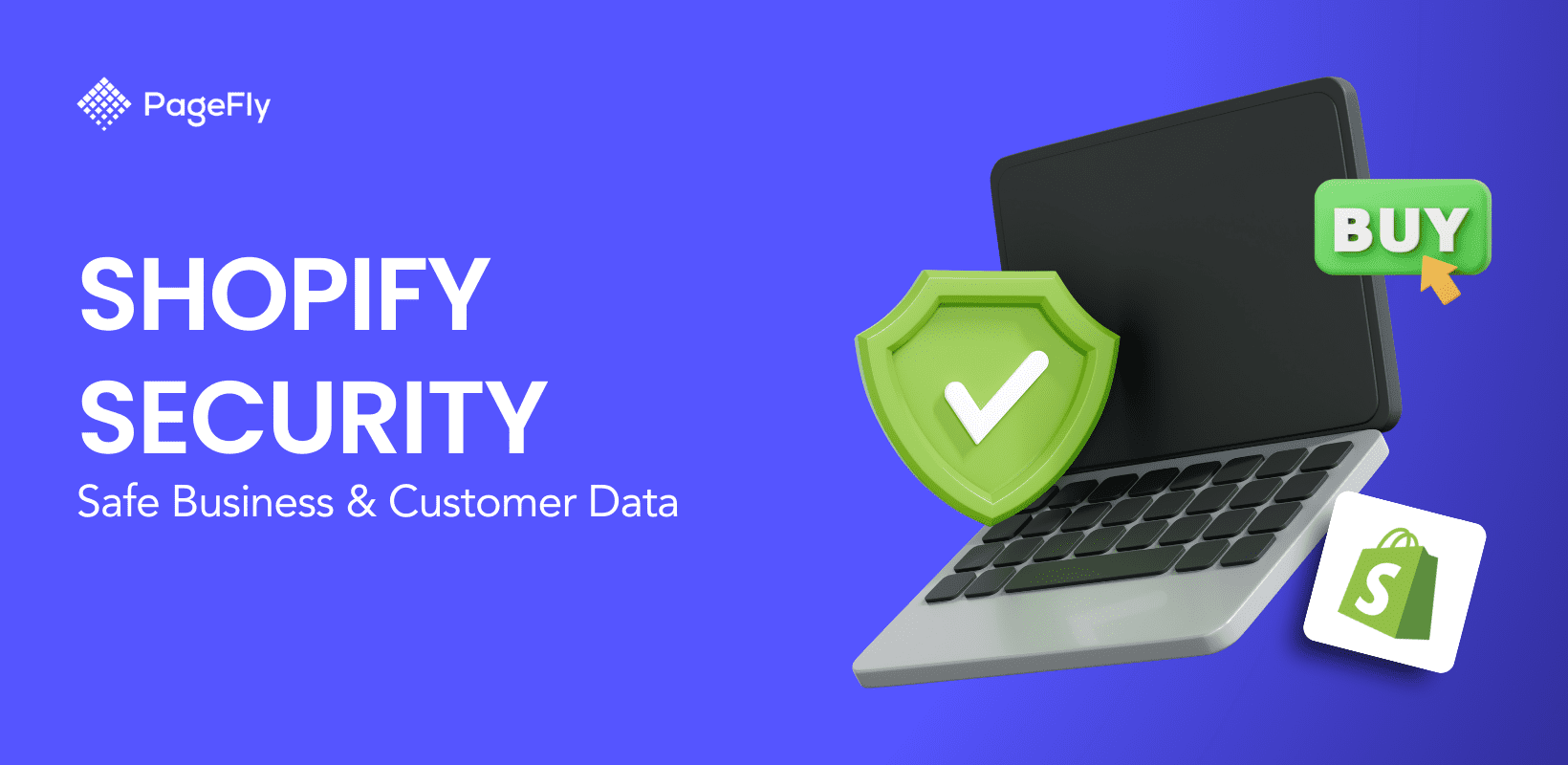Shopify security is a set of tools and practices that are implemented by the platforms to ensure that all Shopify stores are secure.
As such, all Shopify stores contain some security features out of the box. That means that as soon as you get your Shopify account, your online store already has some pre-built security measures and tools to ensure that your data is safe.
Additionally, since Shopify is a cloud-hosted ecommerce platform – meaning that all your data is stored in Shopify servers across the world, they also need to implement some security measures to physically and virtually ensure the platform’s security as a whole, as well as of every Shopify store.
Let’s delve deep into the top five tools and best security practices implemented throughout the Shopify platform.
Shopify Is Level 1 PCI Compliant
One of the most important Shopify security features that we need to talk about is PCI compliance. Since Shopify is an ecommerce platform that processes transactions using debit and credit cards, it needs to be PCI-compliant to ensure cardholder data security.
What is PCI compliance?
To briefly explain, PCI compliance or Payment Card Industry Data Security Standard (PCI DSS) compliance is a set of security standards that are designed to ensure that all companies that accept, process, store, or transmit debit and credit card information maintain a secure environment.
This means ensuring that a strict security measure is in place to protect credit card information from being stolen or misused.
Is Shopify PCI compliant?
Yes, Shopify is Level 1 PCI compliant. This means that it meets the stringent PCI security standards. Amongst all the Shopify security features, this one is arguably the most important one to have as it is like every ecommerce platform to process online card payments.
Being PCI compliant, Shopify ensures that hackers don’t gain access to sensitive cardholder information when customers make purchases in Shopify stores.
Shopify payments are designed to integrate seamlessly with Shopify’s PCI compliance measures, providing an additional layer of security for every transaction, thereby protecting customer data.
Shopify security measures to make cardholder data safe cover all six PCI standard categories:
- Maintain a secure network
- Protect cardholder data
- Maintain a vulnerability management program
- Implement strong access control measures
- Regularly monitor and test networks
- Maintain an information security policy
For more information, read: Shopify Help Center | Compliance reports
Every Shopify store is PCI-compliant
Since Shopify is PCI compliant on a platform level, that makes all Shopify stores PCI compliant by default. When you choose Shopify to run an online store, you can ensure that the platform has paid serious attention to protecting cardholder data.
Physical Security
In addition to online security, Shopify also implements physical security measures to ensure utmost protection. They conduct annual on-site assessments for physical security monitoring to make sure that no unauthorized person accesses their servers and injects malicious scripts whatsoever.
These physical security measures play an instrumental role in preventing data breaches, ensuring that merchant and customer information is not compromised through unauthorized physical access.
According to them,
- Shopify implements reasonable measures designed to prevent unauthorized physical access, damage, or interference to its services.
- They use appropriate control devices to restrict physical access to their services only to authorized personnel who have a legitimate business need for such access.
- Shopify conducts periodic reviews to ensure continuous adherence with these standards.
SSL Certificate Or Secure Sockets Layer
An SSL or Secure Sockets Layer certificate is a digital certificate that authenticates a website’s identity and enables an encrypted connection between the user and the website.
This encryption ensures that every data interchange between a user’s browser and the website remains private and secure.
Note: SSL is sometimes referred to as TLS or Transport Layer Security. As such, all Shopify stores have TLS certificates.
How to know if a website has an SSL certificate?
One way to make sure that a website that you’re visiting is secure and has an SSL certificate is if it has https://in its URL instead of http://
Here are some Shopify store URLs:
- https://www.gymshark.com/
- https://www.allbirds.com/
- https://spanx.com/
Another way to confirm if the website you're visiting has an SSL certificate is by clicking the site information icon at the beginning of its URL. Clicking the button will reveal a drop-down box that will indicate whether the website is secure or not.

HTTPS or Hypertext Transfer Protocol Secure is the secure version of HTTP which was commonly used way back in the earlier days of the internet.
Nowadays, HTTPS is a must for every website. And when a website you’re visiting still has the legacy HTTP, your device could be at risk of potential malware.
On the other hand, if you see the HTTPS in the URL, it means that the connection is encrypted and it prevents hackers from intercepting sensitive information such as login credentials, credit card numbers, and other personal data.
Thus, an SSL certificate acts as a protective shield that safeguards users’ data during online interactions.
Every Shopify store has an SSL certificate
Every Shopify store comes with an SSL certificate. Shopify security measures like SSL certificates alongside PCI compliance help build customer trust by ensuring that their sensitive information is shielded from potential threats.
Shopify Content Security Policy
Shopify’s Content Security Policy or CSP is a security measure that protects your online store from various cyber threats, particularly those that involve malicious scripts like XSS or cross-site scripting and data injections.
How does a CSP work?
By activating CSP on your Shopify store, you specify which sources are trusted to load scripts, styles, fonts, and other resources in your online store. This means that only content from these sources will be allowed to load on your Shopify store.
This effectively blocks any potentially harmful content from untrusted, unknown, or malicious origins.
CSP needs to be activated on your Shopify store
If you want this Shopify security feature, you need to manually activate it from your Shopify admin. As such, you have to define these trusted sources to enhance your online store security and protect both you and your customers from cybersecurity threats.
Follow this guide to set up a content security policy: Add a content security policy
Two-Factor Authentication or 2FA
Two-factor authentication or 2FA is an extra layer of security that prevents unauthorized users from gaining access to an online account.
2FA in Shopify security works like this:
You enter your login credentials. Instead of immediately gaining access to your website, Shopify will ask you to provide an additional piece of information that’s sent to another device or an associated account. This second factor could be a code sent to your phone, an app-generated code, a fingerprint scan, etc.
This additional step significantly enhances your Shopify security. Even if someone manages to steal your username and password, they won't gain access to your account because they don’t have access to the second factor.
It’s a simple but very effective feature that protects your Shopify admin from unwanted access.
Think of 2FA as a door with two locks – one that requires a number combination and one that requires a physical key. Even if someone figures out the number combination, if they don’t have the physical key, they won’t be able to open the door.
With That In Mind, Is Shopify Secure?

Source: Pexels
Considering all the security features mentioned above, we seek to answer the question:
“Is Shopify secure?”
And the answer is a firm Yes. Let us affirm why that is so by summarizing the security features mentioned above.
PCI Compliance
Shopify’s Level 1 PCI compliance adheres to the standards that aim to protect cardholder data. This ensures that cardholder information remains inaccessible to hackers during and after transactions on any Shopify store.
Physical Security Assessment
Shopify’s security measures that involve annual and periodic on-site assessments ensure that all servers that contain all merchant and customer data are safe from unwanted access. They use control equipment to restrict access only to authorized personnel, guaranteeing that a data leak won’t happen.
SSL Certificate On Every Shopify Store
Every Shopify store comes with an SSL certificate. This means that data interchange is encrypted, preventing hackers from intercepting any information.
Content Security Policy Activation
Shopify’s Content Security Policy or CSP, when activated, could secure your online store from malicious data by preventing content from unwarranted sources from loading on your online store.
2FA
Two-factor authentication adds an extra security layer by requiring a second form of verification when accessing a Shopify account. Therefore, even if someone can steal your login credentials, they won’t be able to access your Shopify account if they don’t have the second-factor security code.
Shopify Cyber Security Tips To Protect Your Business

Source: Pexels
Even though Shopify is secure, that does not mean that you’ll just rely on these features to protect your website. There are additional steps that you can take to further enhance your Shopify cyber security to ensure that your website won’t experience any downtime due to security issues.
Remember that running a Shopify store comes with an added social responsibility to protect your trusting customers. After all, it’s not just your data that’s at risk. It’s also your customers’ data – their hard-earned money.
As such, consider implementing these five simple Shopify security measures that can also be applied to all your other online accounts.
Let’s begin:
Generate Unique Passwords & Never Share Your Login Credentials
Creating a strong and unique password is fundamental to maintaining your Shopify security. Here are some tips for generating a password for your online accounts:
- Use a mix of characters: Do not use plain letters or plain numbers in creating a password. Instead, combine all available characters in your keyboard, such as symbols, numbers, letters, and spaces, and use capital letters.
- Avoid common words or related information: Weak passwords start with weak phrases. As such, do not use common words when generating a password. Additionally, do not use related information such as phone number, birth date, address, etc.
- Go for a long password: A long password contains more characters. As such, it’s harder to guess.
- Consider using a password vault: A password vault such as LastPass or 1Password to generate and store complex passwords. With this software, you don’t need to retain a physical copy of your password nor need to remember them.
- Change your password regularly: Make it a habit to change your password once every three months or more frequently.
Quick read: How To Create and Edit Shopify Password Page: A Definitive Guide
Activate 2FA
You already know how two-factor authentication works in enhancing your Shopify security. As such, let’s talk about how you can activate it in your store:
- In your Shopify admin, click your profile on the upper-right corner of the screen.
- Select Manage account
- In the account management page, select Security in the left side of the screen
- Scroll down until you find the Two-factor authentication section
- Click Turn on two-step

- After that, you’ll see a pop-up window that will let you choose your method of authentication. In this case, we chose an Authenticator app (Google Authenticator).

- Choose the authentication method that suits you best and follow the instructions below that.
- After completing the steps, click Turn on.
Your two-factor authentication is now active.
We highly suggest adding a back-up authentication method so you can still log-in to your account in case your primary authentication is not available.
To set a secondary authentication:
- In your Shopify admin, click your profile on the upper-right corner of the screen.
- Select Manage account
- In the account management page, select Security in the left side of the screen
- Scroll down until you find the Two-factor authentication section
- Under Backup methods, click Add another method
- Follow the necessary steps and you’ll have your backup authentication
Use A Passkey
A passkey is another robust security measure for enhancing your Shopify account. Passkeys utilize an authorized device, such as your phone or a flash drive to validate a login.
This means that you can seamlessly log in to your account without entering your login credentials. At the same time, someone who has your login credentials won’t be able to access your store if he or she doesn’t have the passkey.
Here’s how you can activate the Shopify passkey:
- In your Shopify admin, click your profile on the upper-right corner of the screen.
- Select Manage account
- In the account management page, select Security in the left side of the screen
- In the Passkeys section, click the Create a Passkey button

- You will be prompted to select a device to store your passkey.
- Select the device that you want
- Follow the succeeding instructions and you’ll have your passkey
Secure Your Related Accounts
Securing your related accounts is crucial for a comprehensive Shopify security. Since you need an email address to register a Shopify account, ensure that your email address credentials are secured as well. Apply the same Shopify security measures to your email address.
If you’re using a passkey, make sure that no one else has access to that passkey.
Identify Suspicious Login Activities
Your Shopify store’s security will automatically detect unusual login activities. Such as a login attempt from an unrecognized device. As such, you should pay serious attention when Shopify notifies you about this event as it could lead to loss of access to your account when you don't make prompt actions.
With this security feature, you can lock your account until you’re able to recover it. Thus preventing potential harm.
This is where your email address comes into play (that’s why you need to secure it as well). When Shopify detects an unusual activity:
- A ten-digit code will be sent to your registered email
- On the Verify your identity page, enter the code and click Login
- Review the suspicious login activity.
- If it was you, click Yes, this was me
- It it wasn’t, click No, this wasn’t me
- If you click the latter, all users will be logged out from your store and you need to reset your password to keep your account safe.
All Staff Who Has Access To Your Store Should Follow These Rules As Well
Lastly, if you’re employing other staff who have access to your Shopify account, make sure that they follow the same Shopify security protocols as you do.
After all, if hackers can’t hack your Shopify store using your account, they might try to find the weakest link. Make sure that your Shopify security doesn't have any.
And that’s why it’s important to educate your staff about cyber security to ensure that your store is protected in every way conceivable.
Conclusion
As we’ve learned in this article, Shopify is indeed a secure ecommerce platform. From their headquarters down to every online store, Shopify security measures are implemented to ensure an uninterrupted business operation.
But in addition to the platform’s security features, it is worth reiterating that as a user, you also play a crucial role in keeping your online store safe from any security breach.
Follow the cyber security tips we’ve mentioned above and let Shopify do the other heavy lifting for you.
After that, you can focus on your business with priceless peace of mind knowing that your data and your customers are safe.
Read more: Is Shopify Safe For Your Online Business?
Shopify Security FAQ
Shopify is, out of the box, a generally secure ecommerce platform. However, there are more ways to further enhance your online store’s security:
- Generate a unique password and never share it with anyone
- Activate two-factor authentication
- Use a passkey
- Secure your related accounts
- Identify suspicious login attempts
- All staff who have access to your store should follow the same security measures
Yes, Shopify has some important high-level security features built-in to its platform. These are:
- PCI compliance
- SSL certificate
- Shopify Content Security Policy
- Two-factor authentication
Yes, all sales via the Shopify checkout method are secured because Shopify is Level 1 PCI compliant. This means that transactions using credit and debit cards are well protected.












![27 Best Shopify General Stores + Complete Strategy Guide [2025]](http://pagefly.io/cdn/shop/articles/Best_Shopify_General_Stores_2f9d09f2-7c38-4da9-a495-e9f4898ddd68.jpg?v=1757271936&width=1640)





